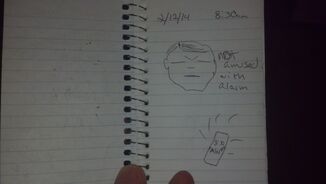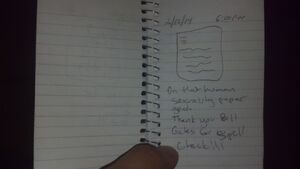
Page out of the diary study from the project
Diary Studies is a great technique to get data about a user without you actually having to be there. It is a form of ethnography, one of the sample versions that doesn't get the whole feeling of the culture, just a part of it.
This is a user research/ethnography method by nature, since you are studying a person(or I guess they are kind of studying themselves since they make the entries) and learning off that. A good context to use this for is when you want to know about someones everyday life with something. This is because with this method you don't have to follow them around all the time, so its nice if you want to know something that happens throughout the day without you following them constantly.
Description of the Method[]
Basic description
"Diaries or journals are guiding artifacts that allow people to conveniently and expressively
convey personal details about their daily life and events to design teams." - Martin and Hanington, Universal Methods of design
The very basic description of this method is you give a diary to someone, tell them what kind of things they are supposed to write down, and then you leave, leaving them in charge of making the notes. The reasoning for this is so you can get a wider varity of notes with you not having to be physically present. It is very useful when done right.
This is a form of ethnography, and this version is aimed at only a small part of the ethnography. It is also good to recommend the subject to do drawings as well as writing diary entries, that way you can get a better feeling for the visual stuff as well, since you miss some of that with this method
Actually Doing the method
The first thing you have to do is find someone to give the diary too, which is the recruiting phase. This can be hard, because you have to find someone that fits what you are studying, but that you can also trust will do the activity and take it pretty seriously. This means the person cannot be too busy as well, because if they are, they are likely going to worry about their own stuff rather then making sure the diary gets done.
Next up is giving them the diary, when you do this make sure to explain what the person has to do. This is a very important part of the process, because its really your only chance at making sure the subject knows whats happening exactly. After that, you leave, and hope everything goes alright with the subject.
After you get the diary back, you should read through it, taking notes. Its also usually a good idea to interview the subject afterwards, to run things past them, and get more information about the subjects entries in the notebook.
Positives and negatives[]
Positives
- Get information from round the clock, unlike other ethnographic studies where you can only get information from when you see them
- Get their perspective on things.
- Could get information about things that are more private to the subject, that they do not want you to straight up see or be it.
Negatives
- You don't know whats happening while the study is going on, and you can't control it.
- Could little or nothing written out when you get it back, since you cant control it.
- Even if they do use it a lot, they may not put exactly the types of things you want down.
- Other then drawings, you can't really see what the subject is talking about in the journals.
Tips and Tricks[]
- Make sure to keep in contact with the person, to make sure they are keeping up with the notebook
- Possibly send out multiple notebooks to make sure you get a information in them.
- Have the post interview in a place related to the study at hand, so you can see what they are talking about, or ask more questions around it. For instance, for the project I used it for, I did it at his house so I can see some of the Tech he talked about.
- Choose the kind of notebook you give to them wisely, and do it based off the person you are giving it too. This is to make them feel more comfortable writing in it.
- Try not to give too leading of instructions, or you might get only certain types of things written down.
Project we used it for[]

Page out of the Diary
The project we did for it was on mundane technology, and how people used it. For it, I found a college undergrad, and had him write stuff in a notebook for three days about his notebook. For this assignment, I ended up getting a cheap small notebook, this was because I wanted him to feel comfortable using it, and because it was small enough to fit in his pocket, so he can carry it around.
This project went surprisingly well, with him making a lot of notes in the diary. I was surprised to also see a lot of drawings, him making one for most of the events that happened. While the diary was filled with pages, I have to say the most useful part was the interview afterwards. I basically ended up going through almost all the pages with him in the diary, asking about why he put them down, getting more information on the events, and how they connected to other events he put down. It was very interesting, and really got me to realize the power of the interview in combination with other methods.
Hughes's Corner[]
In my opinion, Diary studies is pretty cool. I think you can learn a lot, if you are lucky and get a subject that is willing to fully commit to it that is. Even if you don't get that much information from the person through the diary, an interview afterwards can get you a lot more information an help fill in the gaps. I definitely would try this again. Also they are way better then probes in my opinion in the methods were you leave stuff for subjects to do on their own.
An Added Bonus: You can get other stuff done as its going on. Since you do not have to worry about the diary until you get it back, you have time to do other stuff. Your basically removing yourself from the ethnography, and letting the subject do it for you. I really get that this is just an after effect of the method and not the true point of it, but the fact still remains true. Sure you have to do all the design work afterwards, but it still removes a process for you. You could even do more research while this is going on, get double the research.